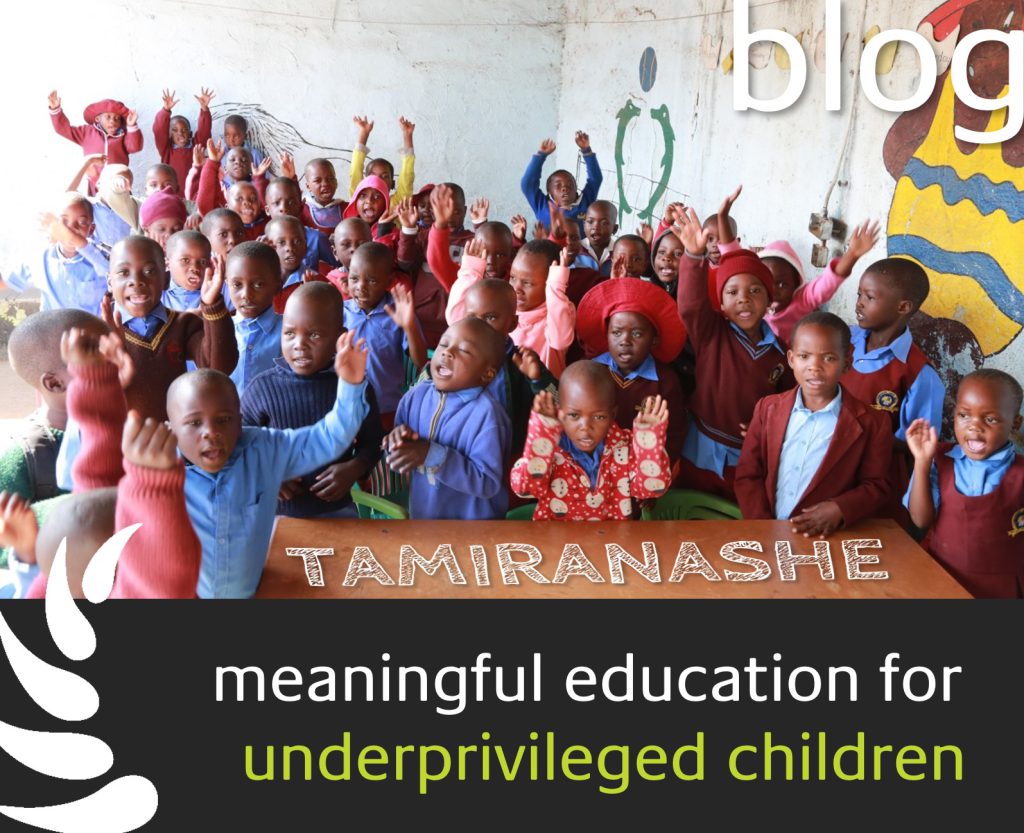A few weeks ago, we started a blog series about the beneficiaries of kanthari participants. Today we will read an interesting story from Nancy Mbaura from Zimbabwe. We will soon also learn more about Nancy and her walk of life, however today the blog is more focused on her beneficiaries.
Tamiranashe – meaningful education for underprivileged children
by Nancy Mbaura
My parents gave a preference for the sons to receive an education instead of the daughters. For me to go to school was a big battle. I struggled to work for my fees to go to school. When my father and mother subsequently fell ill, I assumed the family role of breadwinner. I became a girl-child heading a family. I completed my primary and secondary education the hard way. Poverty forced me to marry. I thought marriage was the only way to get me out of poverty. However, my husband was abusive and kicked me out of the house and married another woman. A lot has happened since, and all of it motivated me to start the Tamiranashe Education Empowerment Project.
The community I serve is in a rural farming area. Many of the people here used to be farm workers but now most of them are out of jobs and living in abject poverty. Many families, especially in Norton high-density areas find it hard to put food on the table. Most families in the area have a migrant background and they do not have Identification Documents (IDs), which disadvantages the children as they do not have documents for registering in schools. The schooling system in Zimbabwe requires every child to have a birth certificate.
Resulting from a lack of sustainable livelihoods, many women end up engaging in sex work for survival, and a significant number of those women end up getting infected with HIV/AIDS, often dying, leaving their children orphaned. Most of our direct beneficiaries are orphans, as well as vulnerable children coming from impoverished families.
Edward Zimba sits upright in a threadbare uniform, torn and far too big for his frame. He is in the final year of primary education. Edward is an orphan who lives with his widowed grandmother. After the death of his parents, he missed school for 5 years. Edward used to play soccer with other children after school. He always brought the soccer ball, which they make from plastic waste, as they can’t afford to purchase a real soccer ball. Apart from his love and talent for soccer, on the academics front, he was struggling when he first enrolled at Tamiranashe. Before his enrolment in our school, he used drugs and alcohol as a coping mechanism; with our help he had to go through a rehabilitation program. Years later after enrolling in our school he is improving in his reading and writing skills and his thirst for education is helping him to become a better person.
Our beneficiaries range from children in need of an education to better their tomorrow, to adults who failed to get the chance when they were still young and are in need of basic education to improve their livelihoods. Jessica, a single mother of 2 was recently divorced and left the marriage without a single asset as she was illiterate and did not have the knowledge or assistance to work through the legal documents that could have helped her. Growing up she was not given a chance to go to school. Her family was poor and the little they had was spent on her male sibling’s education instead. This is a similar situation with many girls in the area, who are considered not important enough compared to the male child. At Tamiranashe the female beneficiaries have a chance to feel that they also matter in life and through education they are learning to express themselves more and discover possibilities for earning better livelihoods as well as grow their self-confidence.
Many families in the area follow a type of religion, which is well known for forcing young girls to marry older men who are often leaders. This was the case with Anna, a 12-year-old girl who was forced to become the sixth wife of a man aged 78. After marriage, many are forced to drop out of school, and our drive is to protect them from such occurrences that end up robbing them of their childhood innocence.
I don’t want children and women to undergo the same problems I faced on my journey in life, that is why I started Zimbabwe’s first pro-poor school, primary and secondary levels, and a skills college. To date, we taught 2000 children and trained 3000 women.



